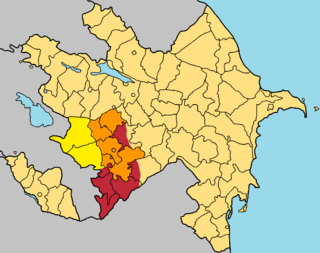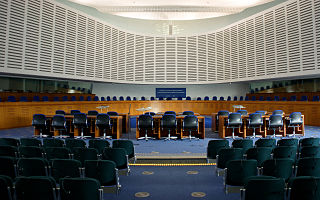The LaGrand case was a legal action heard before the International Court of Justice (ICJ) which concerned the Vienna Convention on Consular Relations. In the case, the ICJ ruled that its own temporary court orders were legally binding and that the rights contained in the convention could not be denied by the application of domestic legal procedures.

Cultural genocide or culturicide is a concept described by Polish lawyer Raphael Lemkin in 1944, in the same book that coined the term genocide. The destruction of culture was a central component in Lemkin's formulation of genocide. Though the precise definition of cultural genocide remains contested, the Armenian Genocide Museum defines it as "acts and measures undertaken to destroy nations' or ethnic groups' culture through spiritual, national, and cultural destruction". The drafters of the 1948 Genocide Convention initially considered using the term, but later dropped it from inclusion.

Bosnia and Herzegovina v Serbia and Montenegro [2007] ICJ 2 is a public international law case decided by the International Court of Justice.

This article focuses on ethnic minorities in the Republic of Azerbaijan.
The Jewish community of Oslo et al. v. Norway was a case decided by the UN Committee on the Elimination of Racial Discrimination in 2005.
The 2010 Mardakert clashes were a series of violations of the First Nagorno-Karabakh War ceasefire. They took place across the line of contact dividing Azerbaijan and the ethnic Armenian military forces of the unrecognized but de facto independent Nagorno-Karabakh Republic. Both sides accused the other of violating the ceasefire regime. These were the worst violations of the cease fire in two years and left Armenian forces with the heaviest casualties since the Mardakert clashes of March 2008.

The Madrid Principles were proposed peace settlements of the Nagorno-Karabakh conflict, proposed by the OSCE Minsk Group. As of 2020 the OSCE Minsk Group was the only internationally agreed body to mediate the negotiations for the peaceful resolution of the conflict. Senior Armenian and Azerbaijani officials have agreed on some of the proposed principles but have made little or no progress towards the withdrawal of Armenian forces from occupied territories or towards the modalities of the decision on the future Nagorno-Karabakh status.

The political status of Nagorno-Karabakh remained unresolved from its declaration of independence from the Soviet Union on 10 December 1991, to its September 2023 collapse. During Soviet times, it had been an ethnic Armenian autonomous oblast of the Azerbaijan Soviet Socialist Republic. Following the dissolution of the Soviet Union, a conflict arose between local Armenians who sought to have Nagorno-Karabakh join Armenia and local Azerbaijanis who opposed this.
Anti-Armenian sentiment or Armenophobia is widespread in Azerbaijan, mainly due to the conflict over Nagorno-Karabakh. According to the European Commission against Racism and Intolerance (ECRI), Armenians are "the most vulnerable group in Azerbaijan in the field of racism and racial discrimination." A 2012 opinion poll found that 91% of Azerbaijanis perceive Armenia as "the biggest enemy of Azerbaijan." The word "Armenian" (erməni) is widely used as an insult in Azerbaijan. Stereotypical opinions circulating in the mass media have their deep roots in the public consciousness.

The International Convention on the Elimination of All Forms of Racial Discrimination (ICERD) is a United Nations convention. A third-generation human rights instrument, the Convention commits its members to the elimination of racial discrimination and the promotion of understanding among all races. The Convention also requires its parties to criminalize hate speech and criminalize membership in racist organizations.

Chiragov v. Armenia was an international human rights case regarding the rights to property of Azeri nationals in the Nagorno-Karabakh region of former Soviet Azerbaijan. The judgment of the Grand Chamber of the European Court of Human Rights on the case originated in an application against the Republic of Armenia lodged with the Court under Article 34 of the Convention for the Protection of Human Rights and Fundamental Freedoms by six Azerbaijani nationals on 6 April 2005. The applicants alleged, in particular, that they were prevented from returning to the district of Lachin in territory occupied by the respondent Government, that they were thus unable to enjoy their property and homes located there, and that they had not received any compensation for their losses.

The case Application of the International Convention for the Suppression of the Financing of Terrorism and of the International Convention on the Elimination of All Forms of Racial Discrimination is a case in the International Court of Justice (ICJ). On January 16, 2017, a representative of Ukraine filed a lawsuit at the International Court of Justice to hold the Russian Federation liable for committing acts of "terrorism" and discrimination against Ukraine. The lawsuit alleges violations of the Terrorist Financing Convention and International Convention on the Elimination of All Forms of Racial Discrimination.

The Application of the Convention on the Prevention and Punishment of the Crime of Genocide , commonly referred to as the Rohingya genocide case, is a case which is currently being heard by the International Court of Justice (ICJ). The case was brought forward by the Republic of The Gambia, on behalf of 57 members of the Organisation of Islamic Cooperation in 2019.

The 2020 shelling of Ghazanchetsots Cathedral took place prior to the Battle of Shusha on 8 October, when the Holy Savior Cathedral of the city of Shusha, known as Ghazanchetsots Cathedral, was struck twice by missiles, resulting in the collapse of a part of the roof. Armenia accused the Azerbaijani Armed Forces over the shelling.

Karen Petrosyan v. Azerbaijan was an international human rights case regarding the rights of Artush Petrosyan and his son Karen Petrosyan – an Armenian national from Chinari village, Tavush province of Armenia, who died while in captivity in Azerbaijan in 2014. The judgment of the European Court of Human Rights on the case originated in an application against the Republic of Azerbaijan lodged with the Court under the Convention for the Protection of Human Rights and Fundamental Freedoms by the applicant, Artush Petrosyan, on 25 April 2016. He Submitted that his son had been publicly humiliated, tortured and killed by decapitation by Azerbaijani State agents and that "his son’s body had not been repatriated in a timely manner, that there had been no effective investigation on and that the alleged violations had occurred as a result of discrimination based on ethnic origin".
Armenian prisoners of the Second Nagorno-Karabakh War are servicemen of the Defense Army of the Republic of Artsakh and the Armed Forces of the Republic of Armenia, as well as civilians and other detainees, who surrendered or were forcibly captured by the Azerbaijani Armed Forces during and after the conflict in 2020 between Azerbaijan and the self-proclaimed Republic of Artsakh together with Armenia in the disputed region of Nagorno-Karabakh and surrounding areas.

Sargsyan v. Azerbaijan was an international human rights case regarding the rights of Armenian refugees displaced from former Soviet Azerbaijan because of the conflict in Nagorno-Karabakh. The judgment of the Grand Chamber of the European Court of Human Rights on the case originated in an application against the Republic of Azerbaijan lodged with the Court under Article 34 of the Convention for the Protection of Human Rights and Fundamental Freedoms by Minas Sargsyan on 11 August 2006. He was forced to flee his home in the village of Gulistan in Shahumyan region of former Soviet Azerbaijan, together with his family, because of the Azerbaijani bombardments of the village and was not allowed to return and unable to get any compensation from the Azerbaijani authorities. Even though the applicant died in 2009, as did his widow, Lena Sargsyan, in 2014, his children, Vladimir and Tsovinar Sargsyan, represented him in court to continue the proceedings.

Allegations of Genocide under the Convention on the Prevention and Punishment of the Crime of Genocide is a case brought before the International Court of Justice (ICJ), the principal judicial organ of the United Nations. It was submitted by Ukraine on 26 February 2022 against Russia following the latter's invasion of Ukraine in 2022, which Russia sought to justify in part by claims that Ukraine was engaged in acts of genocide within the Luhansk and Donetsk oblasts. Ukraine said that these claims gave rise to a dispute under the 1948 Convention on the Prevention and Punishment of the Crime of Genocide, and based its application on the ICJ's jurisdiction to resolve disputes involving the convention. On 16 March 2022, the court ruled that Russia must "immediately suspend the military operations" in Ukraine, while waiting for the final decision on the case.

The blockade of Nagorno-Karabakh was an event in the Nagorno-Karabakh conflict. The region was disputed between Azerbaijan and the breakaway Republic of Artsakh, internationally recognised as part of Azerbaijan, which had an ethnic Armenian population and was supported by neighbouring Armenia, until the dissolution of Republic of Artsakh on 28 September 2023.

On 19–20 September 2023 Azerbaijan initiated a military offensive in the disputed Nagorno-Karabakh region which ended with the surrender of the self-declared Republic of Artsakh and the disbandment of its armed forces. Up until the military assault, the region was internationally recognized as part of Azerbaijan but governed and populated by ethnic Armenians.











